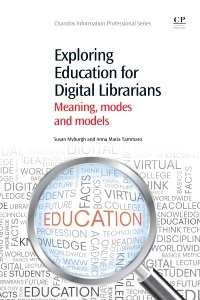Description
Exploring Education for Digital Librarians
Meaning, Modes and Models
Chandos Information Professional Series Series
Authors: Myburgh Sue, Tammaro Anna Maria
Language: English
Subject for Exploring Education for Digital Librarians:
Approximative price 73.94 €
In Print (Delivery period: 14 days).
Add to cart334 p. · Paperback
Description
/li>Contents
/li>Biography
/li>Comment
/li>
The twelve chapters of this book cover key issues in education for digital librarians, including: the necessity of regenerating the profession; current contexts; previous research on education for digital librarians; understanding the dimensions of the discipline and profession of librarianship, and the distinctions between them; the social purpose of librarianship as a profession and the theoretical framework which supports the practice of the profession; a brief analysis of curriculum design, pedagogies and teaching methods, and a glimpse of the proactive and important future role of librarianship in society.
- Considers the ubiquitous misunderstanding that technology can replace libraries and librarians
- Provides a theoretical view of the field which can contribute awareness of dimensions of the dilemmas which the discipline/profession currently faces
- Presents a broad international perspective which provides a basis for a new model for LIS education
Dedication
List of figures and tables
List of abbreviations
Preface
About the authors
Acknowledgements
Chapter 1: Regeneration of the second oldest profession
Abstract:
Introduction
From books to ideas
DLs as socio-technical systems
Education for the information professions
What digital libraries can be
What digital librarians could do
Interpersonal activity
Decoders and interventionists
Digital knowledge creation and critical thinking
Interdisciplinarity
Conclusions
Chapter 2: The influence of the current context
Abstract:
Context
Abbott and the professional context
What is a ‘profession’?
Context 1: the information society
Context 2: context of professions
Context 3: ICTs
Explaining ideologies
Conclusions
Chapter 3: Previous research on education for DLs
Abstract:
The perplexed state of education for information work
Technology and education
DL courses currently offered
DL programmes in LIS and CS
Conclusions
Chapter 4: First things fourth
Abstract:
Unravelling long-standing ambiguities
What do librarians do?
Technical tasks
Purpose and processes
Hegemony
Selection
Access
Organisation of information resources
The social role of librarians and abstruse hegemony
Chapter 5: Purposeful digital librarians
Abstract:
The activities of the digital librarian
LIS education and ideologies
Chapter 6: No theory, no discipline = no profession
Abstract:
Notes towards solving these dilemmas
Theory and praxis
Distinction between theory and praxis
Disciplines
Neutrality of science
The information metacommunity
Multidisciplinary metacommunities and their metatheories
Digital library research and education is particularly inter- and multidisciplinary
Facilitating interdisciplinary work
Chapter 7: Constructing a theoretical framework
Abstract:
The purpose of a theoretical framework
Steps of theory construction
Step 1: clarification of the axiological position of the researcher(s)
Step 2: nomos, or ‘existing situation’
Step 3: existing theories examined and tested teleologically
Step 4: lexical register and conceptual identification
Step 5: development of alternative conceptual models in an ontology
Step 6: taxonomy of information professions
Step 7: model tested against purpose/teleological assumptions
Conclusions
Chapter 8: Designing curricula
Abstract:
Changes in LIS education
Didactics
Epistemological approaches to curriculum design
Creative industries
Cultural institutions
Interdisciplinarity
Chapter 9: Aims and outcomes
Abstract:
Curriculum aims
Professional philosophy and phronesis
Results and effects of the curriculum
Competencies and skills
Graduate qualities
International equivalences
Internationalisation
Chapter 10: Pedagogies and teaching methods
Abstract:
Teaching and learning
Use of ICTs in education
Social responsibilities of higher education
Epistemological frameworks for learning
Social constructivism
Social constructionism
Connectivism
Three common modes of teaching/learning
Critical pedagogy as heutagogical
The Socratic method
Online learning and heutagogy
Education, culture and internationalisation
Digital and critical literacy, critical thinking
Chapter 11: Content and structure
Abstract:
Substance and speculation
Theoretical framework
Human information behaviour
Knowledge creation
Representation of information: language and linguistics
Evaluation of information: interpretation, meaning and critical information literacy
Evaluating information economically
Technology and other ‘stuff’
Level of programme
Structure
Metacommunity
Core
Chapter 12: A bright future
Abstract:
The past and the future
Libraries and freedom of thought
Democracy and social role
Metacommunity and agreement
Changed service model
Evaluation of the social role of librarians
New profile
Research for the future
References
Index
Anna Maria Tammaro is currently Professor at the University of Parma, Italy. She is also Local Co-ordinator of the International Master’s in Digital Library Learning (DILL), Chair of IFLA Division IV, and an IFLA Governing Board member. Anna Maria has extensive experience in academic librarianship, having been the Librarian at the University of Florence and the University of Bologna, Italy.
- Considers the ubiquitous misunderstanding that technology can replace libraries and librarians
- Provides a theoretical view of the field which can contribute awareness of dimensions of the dilemmas which the discipline/profession currently faces
- Presents a broad international perspective which provides a basis for a new model for LIS education




